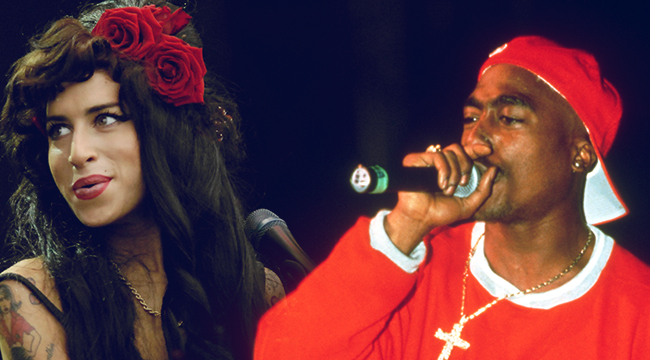
Machines are taking over the world, but there’s one job they can’t do better than a human: Performing music live onstage. Yet, that won’t stop them from trying. The Associated Press recently announced that Amy Winehouse would be returning to the spotlight as a hologram, a partnership between BASE Hologram and the singer’s estate, which consists mainly of her parents due to the fact that she did not leave a will. The hologram, descended from the same technology that resurrected Tupac for Coachella in 2012, will “perform digitally remastered arrangements of [Winehouse’s] classics… backed by a live band, singers and theatrical stagecraft.”
Neither Amy Winehouse, Tupac, or any other artist should be exploited in death by fancy technology and greedy promoters, but that’s exactly what stands to happen as BASE prepares its digital stand-in for the deceased soul singer for the expected world tour next fall.
When the Tupac hologram first resurrected the revolutionary rapper at Coachella in 2012, it offered a jaw-dropping spectacle for those in the crowd. Later, though, fans and media alike raised concerns about whether or not Tupac would want to perform Coachella, let alone send a ghoulish stand-in to replace him.
While the hologram could capture the broad strokes — his mannerisms, his voice, his menacing scowl or his charming grin — it couldn’t capture his essence, his passion. It couldn’t react to the crowd in real time, only playing out its script like a film. There’s no give-and-take with the crowd or its co-stars. There’s no physical sensation or hope that a front row fan can reach out and feel the warmth of Pac’s hand as he dapped them up. It’s just light and smoke, leaving behind all the questions of what the real Tupac would have done — if he could even be convinced that Coachella was the right venue for his specific style of roughshod, spitfire social commentary and fiery antagonism.
The same questions will undoubtedly dog the Winehouse tour as well: What would Amy have wanted? How would Amy have benefitted? Could she even physically commit to such a tour with her health in question were she alive? Remember how Amy sang “they tried to make me go to rehab but I won’t go” because “my daddy thinks I’m fine?” That wasn’t just a clever lyric from her breakthrough single, it was a true story. In the 2015 documentary film Amy, her father, Mitch Winehouse, admits that he told her to forego treatment for her addictions in order to complete and promote Back To Black, her second, final, and most successful album before her death.
Hindsight is 20/20, sure, but the incident highlights all the ways in which the industry exploits artists to their detriment to maximize profits. There’s something that feels inherently wrong about sending the “artist” on tour without their consent, because a hologram can’t complain, can’t get tired, can’t get sick, and can’t speak up for itself the way a flesh-and-blood person could. It’s the equivalent of automation in in manufacturing except for one key difference: A machine can’t create on its own. This process separates the creation from its creator for the benefit of a label or an estate, without the artist’s input.
Finally, what happens to an artist’s legacy when they can no longer control their catalog or even their likeness after they’re gone? We’ve seen the legal battles of the Prince estate, where vaulted material the artist wanted destroyed is being packaged up and licensed out to the same corporations he felt held him hostage and made him a “slave” during his life. Prince would probably come screaming back as an outraged phantom should it even be suggested he make a posthumous appearance as a mindless, programmed automaton — and he damn near did.
Artists’ final wishes should be respected, because respect shouldn’t end with their physical presence. If we love them as much as we say we do, we should let them have the dignity to determine how they are remembered as much as possible. Besides, a hologram is just a computer algorithm and a light show, completely incapable of improvisation or emotion, the elements that make live performance so affecting in the first place. Anyone buying a ticket to watch such a hollow display would only be getting ripped off, but moreover, the disservice to the legacies of artists like Amy Winehouse, Tupac and Prince is not worth any price.






